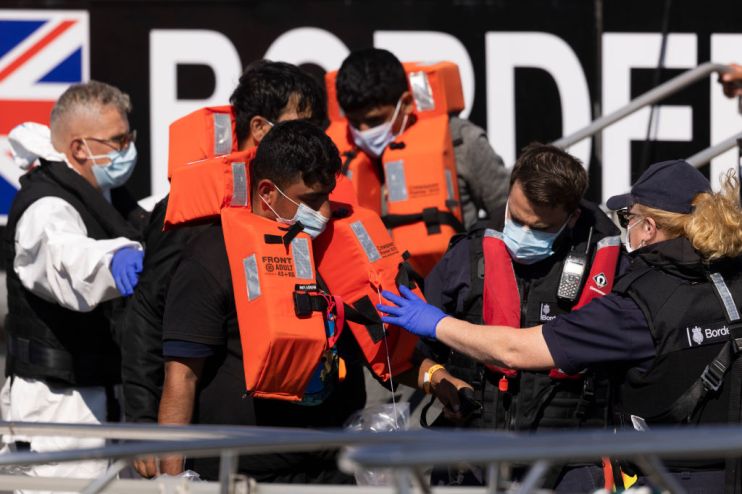The law’s delay: Priti Patel must fix the asylum process to stop Channel boats

Being Home Secretary is hard. It has long been known as the “graveyard of careers”, with headstones marked Smith, Clarke and Blunkett. One of the longstanding problems is that the Home Office is essentially reactive. Even after losing responsibility for courts in 2003 and prisons and probation in 2007, it oversees law and order, borders and national security, responding to threats as they arise.
This weekend Priti Patel’s in-tray has been topped by the crisis in the English Channel, as desperate men, women and children try to reach the UK. Patel remarked last Thursday that calling these people “migrants” was dehumanising; odd, as “economic migrants” had been the standard government usage for some time, and she had previously—and inaccurately—said that 70 per cent of them were “not genuine refugees”.
Arguments about terminology seem to be squabbling on the margins. But they are not a Britain-only sport: Gérald Demarnin, the French interior minister, cancelled a meeting with Patel after a letter from Boris Johnson to Emmanuel Macron was made public. The French government’s official spokesman described the communication as “mediocre in terms of the content, and wholly inappropriate as regards the form”. One Westminster source reflected that “pique” is a French loan word.
Voters lack the patience either for the Home Secretary’s stubborn sloganising or French sensitivity. Last week’s crisis, which saw at least 27 people drown in a flimsy raft, has underlined what should already have been obvious, that the UK and France need to co-operate on measures which will make a difference now and in the days to come. Conservative MPs are telling the prime minister that cross-Channel movement of people is at the top of the electorate’s concerns, especially in south coast constituencies.
Patel has struggled to manage the Channel crisis. Last year it was mooted that asylum seekers could be held and their claims processed on Ascension Island in the South Atlantic, 4,000 miles from the UK. This summer, the Home Office was found to have acted unlawfully in housing asylum seekers during the pandemic. And the numbers are only increasing: 2020 saw 8,500 people cross the Channel, while this year to date has seen that figure explode to 23,000.
Die-hard Remainers argue that the problem has been exacerbated by Brexit. That may or may not be so: it is not, however, helpful, as the UK is now outside the European Union and will stay there for at least the foreseeable future. Sovereign states such as the UK and France can and do make joint arrangements on issues of mutual benefit.
It is equally unhelpful for Brexiteers to blame the EU’s Schengen area of internal free movement: that is not going to change, so France remains the external border for the whole union.
The solution must come in two parts. Firstly, and most urgently, there must be more effort devoted to intercepting and stopping illegal Channel crossings. These are not only infractions of the law, they are extraordinarily dangerous, as we sadly witnessed last week. The only ones with a stake in these going on unhindered are the people-traffickers. Stopping these crossings will require extraordinarily close co-operation between the border authorities of France and the UK, and the deployment of any and all technological solutions to the problems of detection and safe interception.
The second part must be making the processing of asylum claims and the deportation of unsuccessful claimants as swift, efficient and fair as possible. Whether those crossing the Channel are 70 per cent economic migrants or 60 per cent genuine refugees—accounts differ—these decisions must be reached quickly. Recent figures published by the Home Office showed there had been a jump in wait times for asylum applications to be processed. This can only be partially explained by the sheer volume of bids for refuge. The longer even bogus claimants remain in the UK, the more tempting the crossing will become, because once feet hit soil, anything is possible.
The UK must project a message that we welcome refugees, but that we will do everything to frustrate the people-traffickers. Any assessment will be robust but fair and, above all, swift. If you are fleeing for your life, you will find a safe haven in the UK.
If you seek a better life, you must be judged with other applicants for residence. But you will not be endangered, either in getting to the UK or after your arrival.
Right now, in the corridors of the Home Office, little else matters.